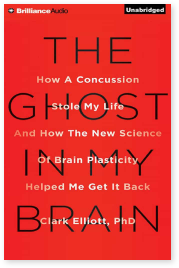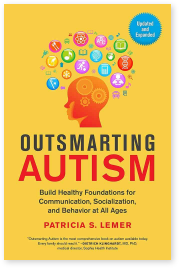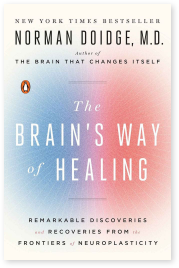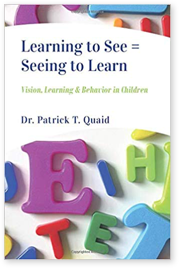Neuro-Optometric Rehabilitation
Going far beyond the standard 20/20 eye examination and use of traditional eyeglasses and contact lenses.
Beyond Traditional Eye Exams
Neuro-optometric rehabilitation goes far beyond the standard 20/20 eye examination and use of traditional eyeglasses and/or contact lenses to sharpen central eyesight. The eye’s retina is a piece of brain tissue and can be affected by brain injuries, brain and nervous system disorders and neurochemical imbalances. Similarly, the retina can impact brain function and brain biochemistry by how it receives light stimuli and perceives its surrounding environment and how it integrates with auditory and other sensory systems.
Optometrists experienced in neuro-optometric rehabilitation utilize a variety of tests, protocols and visual learning games to evaluate and enhance a patient’s overall visual performance, visual function and visual processing capabilities, including eye alignment; eye movements and tracking; eye-hand coordination; binocular vision and depth; visual-motor and perceptual-cognitive skills; and various visual systems’ integration with other sensory systems, including hearing and balance.
Oftentimes, neuroplasticity can alter dysfunctional circuitry and symptoms of brain injuries, such as vertigo, concentration/attention problems and headaches, over time through redevelopment of visual processing skills and use of non-traditional “brain” eyeglasses, as well as other optometric interventions, including prisms and shading or colored tints.
Interested in Visiting Our Clinic?
Get in contact with one of our New Patient Advocates to book an appointment.
At the Mind-Eye Institute we understand that interactions between the electrical and biochemical pathways in the brain affect physical, physiological and psychological systems. Visual interventions that alter retinal signaling pathways impact both the electrical and biochemical systems.
Our patients undergo thorough examination with advanced technology and testing techniques to measure their reactions and responses to light entering the retina. With this information, experts at the Mind-Eye Institute determine whether a patient’s visual and auditory systems are synchronized. They consider how light might be manipulated to positively impact brain function and body chemistry. The goal is to find optimal ways of mitigating symptoms that are not improved or resolved through standard approaches.
Specifically, our team offers patients prescriptive eyeglasses, contact lenses or other optometric interventions to selectively stimulate light dispersed on the retina. Individualized lenses can:
Getting In Touch With Us
To learn about next steps for registering as a patient or registering a child as a patient, please call the Mind-Eye Institute office at 847.744.9167 or you can fill out our online New Patient Inquiry Form provided here.
The Mind-Eye Institute is a non-participating provider with any insurance company. We don’t bill your insurance directly, but our team will provide you with the necessary documentation to submit to your insurance company for partial reimbursement following your visit.
New Patient Inquiry
Thank you for your interest in scheduling an appointment at the Mind-Eye Institute.
'Dr. Zelinsky Is Renowned'
Norman Doidge, M.D. & Clark Elliott, Ph.D., Dr. Patrick Quaid and Patricia S. Lemer praise her accomplishments:

"Zelinsky fit Elliott with a series of eyeglasses designed to improve the perceptual damage that made his life so difficult... Getting fitted for Zelinsky's eyeglasses is like no eye appointment you've ever had... Now, Elliott says, he is almost entirely symptom-free, able to problem-solve, multi-task and find his way easily — all abilities he lost in the auto accident in 1999. When he put on his Phase VI glasses he felt something that he hadn't felt for years: "I felt normal."
Review: 'The Ghost in My Brain'
The Chicago Tribune

"One brilliant Chicago-area optometrist I know, Deborah Zelinsky OD, FNORA, FCOVD, has developed a unique, patented, easy-to-administer evaluation called the Z-Bell Test. This test measures the efficiency of integration between visual processing and listening....A 2014 study at Vanderbilt University found that children with autism do not synchronize their seeing and hearing...I have watched Dr. Zelinsky administer this test to disbelieving colleagues, who were astounded by its accuracy and results...Over the past two decades, The Z-Bell Test has become internationally recognized by the scientific community.”
Patricia S. Lemer,
Licensed Professional Counselor (LPC)

"I visited Dr. Zelinsky, and she showed me how she can use optical lenses to alter sensory filtering, by directing light to different retinal cells and brain circuits. This can influence activity in the brain and the hypothalamus to better regulate body chemistry, sensory integration, and even some auditory processing. [Dr. Zelinsky] works frequently with patients working with learning and cognitive disorders as well as TBIs."
Norman Doidge, M.D.

"I was delighted to have Dr. Zelinsky personally contribute to the book. Her wealth of knowledge in the area of visual development and visual processing is widely known, not just through her contribution of eye-care to the author of “The Ghost in My Brain”, but also via her Mind-Eye Institute and the lectures and training their provide. Dr. Zelinsky is not just colleague and a friend, but also a valued member of the neuro-optometric community and an invaluable bridge to other allied professions treating brain injuries. Her contribution to the book is deeply appreciated."
